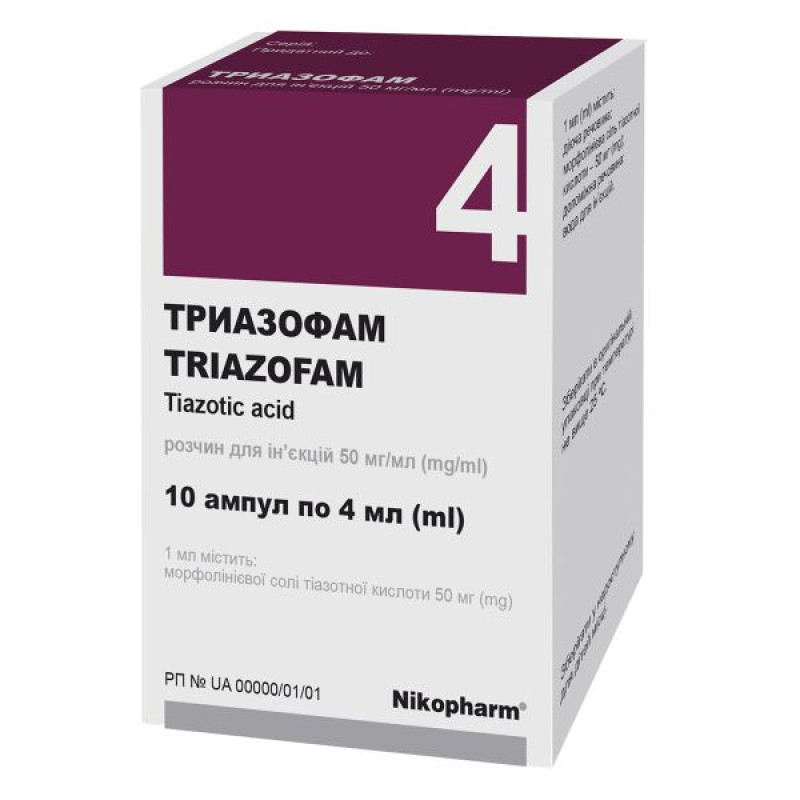Triazofam solution for injection 50 mg/ml ampoules 4 ml No. 10

Instructions Triazofam solution for injection 50 mg/ml ampoules 4 ml No. 10
Composition
active ingredient: thiazide acid;
1 ml of solution contains 50 mg of morpholinium salt of thiazide acid, calculated as 100% substance, which is equivalent to 33.3 mg of thiazide acid;
excipient: water for injections.
Dosage form
Solution for injection.
Main physicochemical properties: transparent colorless or slightly yellowish liquid.
Pharmacotherapeutic group
Cardiological drugs. Other cardiological drugs. Thiazide acid. ATX code C01E B23.
Pharmacological properties
Pharmacodynamics.
The pharmacological effect of thiazide acid is due to its anti-ischemic, membrane-stabilizing, antioxidant, and immunomodulatory effects.
The effect of the drug is realized by enhancing the compensatory activation of anaerobic glycolysis and activation of oxidation processes in the Krebs cycle with the preservation of the intracellular ATP pool. The presence in the structure of the thiazolidinedione molecule of sulfur thiol, which is characterized by redox properties, and tertiary nitrogen, which binds excess hydrogen ions, causes the activation of the antioxidant system. The strong reducing properties of the thiol group cause a reaction with reactive oxygen species and lipid radicals. Reactivation of antiradical enzymes - superoxide dismutase, catalase and glutathione peroxidase - prevents the initiation of reactive oxygen species.
The effect of thiazide acid leads to inhibition of lipid oxidation processes in ischemic areas of the myocardium, reduction of myocardial sensitivity to catecholamines, prevention of progressive inhibition of cardiac contractile function, stabilization and reduction of the area of myocardial necrosis and ischemia, respectively. Improvement of the rheological properties of blood is carried out by activating the fibrinolytic system. Improvement of myocardial metabolic processes, increase of its contractility, promotion of normalization of heart rhythm allow us to recommend thiazide acid for the treatment of patients with various forms of ischemic heart disease.
Pharmacokinetics.
The maximum concentration of thiazide acid in the blood plasma is achieved after intramuscular administration - after 0.84 hours, after intravenous administration - after 0.1 hours. Binding to blood proteins does not exceed 10%. Thiazide acid accumulates mainly in the kidneys - 31%. In significant quantities, it accumulates in the colon, heart, spleen, the smallest - in the small intestine and lungs (1-2%).
Indication
In the complex treatment of ischemic heart disease: angina pectoris, myocardial infarction.
Contraindication
Hypersensitivity to thiazide acid, acute renal failure.
Pregnancy and breastfeeding.
Children's age (up to 18 years).
Interaction with other medicinal products and other types of interactions
The drug Triazofam can be used in combination with basic treatment agents for ischemic heart disease.
Application features
Missing.
Use during pregnancy or breastfeeding
Experience with the use of the drug during pregnancy or breastfeeding is insufficient.
Ability to influence reaction speed when driving vehicles or other mechanisms
In case of adverse reactions from the central and peripheral nervous system, caution should be exercised when driving vehicles and working with other complex mechanisms.
Method of administration and doses
In case of myocardial infarction and unstable angina, the drug is administered intravenously slowly in 2 ml of a 50 mg/ml solution (100 mg) at a rate of 2 ml/min or intravenously drip at a rate of 20–30 drops per minute (2 ml of a 50 mg/ml solution is diluted in 150–250 ml of 0.9% sodium chloride solution) or administered intramuscularly in 2 ml of a 50 mg/ml solution (100 mg) 2–3 times a day. The course of treatment is 14 days.
For angina pectoris, the drug is administered intramuscularly in a dose of 4 ml of a 50 mg/ml solution 2 times a day (daily dose – 400 mg). The course of treatment is 14 days.
Children.
Experience with the use of the drug in children is insufficient.
Overdose
In case of overdose, the concentration of sodium and potassium in the urine increases. In such cases, the drug must be discontinued. Treatment is symptomatic.
Adverse reactions
The drug is usually well tolerated. In patients with increased individual sensitivity, the following may occur:
Skin and subcutaneous tissue disorders: itching, skin hyperemia, rash, urticaria;
from the immune system: cases of angioedema and anaphylactic shock have been described while taking other drugs;
others: fever, cases of chills and changes at the injection site.
Patients (mostly elderly) may experience the following when taking other medications:
from the central and peripheral nervous system: general weakness, dizziness, tinnitus, headache;
from the cardiovascular system: tachycardia, arterial hypertension, decrease in blood pressure;
from the digestive system: manifestations of dyspeptic phenomena, including dry mouth, nausea, bloating, vomiting;
Reporting of suspected adverse reactions
Reporting adverse reactions after the registration of a medicinal product is important. This allows monitoring of the benefit/risk ratio when using this medicinal product. Medical and pharmaceutical professionals, as well as patients or their legal representatives, should report all cases of suspected adverse reactions and lack of efficacy of the medicinal product via the Automated Information System for Pharmacovigilance at the link: https://aisf.dec.gov.ua.
Expiration date
2 years.
Storage conditions
Store in original packaging at a temperature not exceeding 25 ° C. Keep out of the reach of children.
Packaging
2 ml in a polyethylene ampoule. 10 ampoules in a cardboard pack.
4 ml in a polyethylene ampoule. 10 ampoules in a cardboard pack.
Vacation category.
According to the recipe.
Producer
LLC "PHARMACELL".
Location of the manufacturer and address of its place of business.
Ukraine, 07408, Kyiv region, Brovarskyi district, Kvitneve village, Prorizna st., 3.
There are no reviews for this product.
There are no reviews for this product, be the first to leave your review.
No questions about this product, be the first and ask your question.





